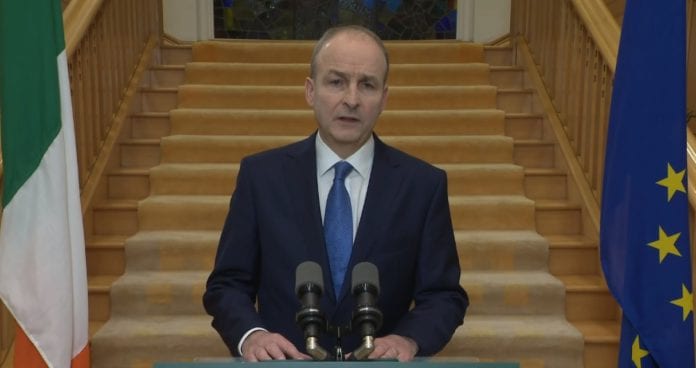Taoiseach Micheál Martin has confirmed that Ireland will be going back into lockdown starting from Christmas Eve, with measures closing hospitality businesses, non-essential services, and a ban on inter-county travel.
The decision to go back into lockdown was confirmed after a Cabinet meeting this morning, as NPHET has expressed concern at rapidly rising case numbers.
Today’s announcement will see the country back in Level 5, but with some alterations to allow retail to remain open and permit people to travel within their county.
Restaurants and pubs serving food will be closing at 3pm on Christmas Eve, and hotels will thereafter only be allowed to serve guests.
All essential services and retail outlets may remain open, with strict control of the number of people in store, but January sales are not permitted.
Gyms, leisure centres and swimming pools may remain open, but only for individual training, and non-contact sports training may continue in pods of up to 15 people.
No inter-county travel will be permitted after St Stephen’s Day, December 26 except for people returning home after Christmas.
Visits to nursing and care homes is also suspended with the exception of visits required for critical and compassionate circumstances
Up to Christmas Eve people may have visitors from a maximum of 2 other households in their home. But from December 27 that will fall to just one other household, and down again to no visitors at all from January 1, either indoors or outdoors.
Religious services may continue with a maximum of 50 people in attendance up to Christmas, but from the 27th, services must move online, and places of worship are only to remain open for private prayer.
Weddings may have up to 25 guests in attendance until January 2, but only six are permitted thereafter, either indoors or outdoors. Funeral services are also restricted to maximum of ten mourners.
The emergency 48 hour travel ban from Britain which was agreed at a meeting of the three heads of government on Sunday has also been extended to December 31.
The National Public Health Emergency Team has said that new case numbers are now going up by approximately 10% a day, in a worrying trend that could overwhelm the health services.
However, there is some hope on the horizon as the rollout of the first coronavirus vaccine is expected before the new year, after the EU approved the Pfizer-BioNTech vaccine for use.












